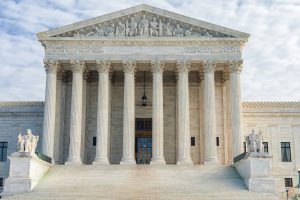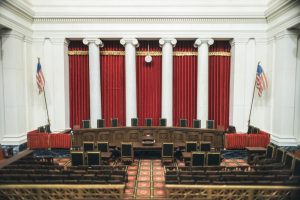A federal statute, 28 U.S.C. § 1782, empowers a district court to authorize discovery from persons or entities located in the United States “for use in a proceeding in a foreign or international tribunal.” In recent years, circuit courts across the country have split on the issue of whether a “foreign or international tribunal” includes private arbitration panels. On June 13, 2022, the U.S. Supreme Court answered the question squarely. It decided two consolidated cases, ZF Automotive US, Inc. v. Luxshare, Ltd. and AlixPartners, LLP v. Fund for Protection of Investors’ Rights in Foreign States. The Court held unanimously that Section 1782 only permits discovery in connection with proceedings involving “governmental or intergovernmental adjudicative bodies.” This includes courts, of course, but also regulatory agencies or arbitral bodies clothed with governmental authority.
This holding means that parties in private arbitrations in other countries may no longer use Section 1782 to obtain discovery from persons in the US. Before this decision, savvy parties could seek out a friendly district court in a part of the country where Section 1782 was authorized for private arbitrations. Now that is no longer an option.
Background
ZF Automotive concerned a dispute between a Michigan company and a Hong Kong company over the sale of certain business units. The parties had agreed that disputes would be submitted to arbitration before the German Institute of Arbitration (“DIS”), a private arbitral institution in Berlin. The United States District Court for the Eastern District of Michigan granted the Hong Kong company’s request to take discovery from the Michigan company under Section 1782, and the Sixth Circuit Court of Appeals declined to disturb the district court’s decision. (The Sixth Circuit had decided in 2019 that Section 1782 could be used to obtain discovery for private arbitrations.[1])
AlixPartners was a dispute between the Republic of Lithuania and a Russian investment fund over a failed bank. The Russian fund initiated arbitration under the Lithuania–Russia bilateral investment treaty, claiming that Lithuania had expropriated an investment in a failed Lithuanian bank without appropriate compensation, in violation of the treaty. After the fund commenced arbitration proceedings, it petitioned the Southern District of New York for an order authorizing discovery from AlixPartners LLP and its Chief Executive Officer, who had served previously as temporary administrator of the failed bank. In opposing the application, AlixPartners argued that the arbitration was not a “foreign or international tribunal” under Section 1782. The district court granted the Section 1782 discovery request, and the Second Circuit affirmed.
The Supreme Court’s Decision
The Supreme Court reversed the decisions in both ZF Automotive and AlixPartners. It reversed ZF Automotive because it held that Section 1782 only authorized discovery for governmental tribunals. It reversed Alix Partners because, although the arbitration in that case was proceeding pursuant to a treaty between two governments, the arbitration panel itself was not created by governments and was not exercising sovereign power.
The unanimous decision authored by Justice Barrett looked to the language of the statute in light of both the statute’s history and the context of other statutes. Standing alone, the word “tribunal” ordinarily might mean a court or court-like body, but could plausibly be read more broadly as well. But the word should not be read alone. It is part of the phrase “foreign or international tribunal.” A “foreign tribunal” is more naturally viewed as one that owes its existence to a foreign government. In other words, a “foreign tribunal” is a tribunal of a foreign country, not merely a tribunal in a foreign country. This conclusion was reinforced by internal evidence of Section 1782’s language, which refers to the “the practice and procedure of the foreign country or the international tribunal.” In the Court’s view, this language does not easily apply to private arbitral panels.
Other evidence supported this conclusion as well. The current version of Section 1782 had come about as a result of Congress establishing a Rules Commission in 1958 to “recommend procedural revisions ‘for the rendering of assistance to foreign courts and quasi-judicial agencies.’” Both courts and quasi-judicial agencies are, of course, creatures of government. Private arbitral panels are not. Note also that the Federal Arbitration Act does not permit discovery for private arbitrations in the US that is anywhere near as broad as permitted under Section 1782. There is no reason to believe that Congress wanted to authorize broader discovery for private arbitrations abroad than domestically. The upshot is that a “foreign tribunal” is created by one sovereign, and an “international tribunal” is created by more than one sovereign.
In both the cases it was addressing (ZF Automotive and Alix Partners), the Supreme Court held that foreign governments had not created the arbitral panels to exercise sovereign power. The panel in ZF Automotive was created by contract, so no governmental power was involved at all. The panel in Alix Partners was convened pursuant to treaty—but although the treaty was between two governments, the panel authorized to hear the dispute was not a creature of any government. That meant Section 1782 could not be used for the treaty-based arbitration, either.
Key Takeaways
As a result of these decisions, parties in strictly private foreign or international arbitrations cannot use Section 1782 to obtain discovery from persons or entities in the United States. The Supreme Court foreclosed any future arguments that an arbitration is governmental just because “the law of the country in which it would sit . . . governs some aspects of arbitrations” or local courts enforce the arbitral agreement. But it did leave the door open just a bit:
None of this forecloses the possibility that sovereigns might imbue an ad hoc arbitration panel with official authority. Governmental and intergovernmental bodies may take many forms, and we do not attempt to prescribe how they should be structured.
As a result of this caveat, we can expect some amount of future litigation about what may constitute a “foreign or international tribunal” for Section 1782 purposes, though not as much as may have occurred had the Supreme Court made a somewhat less restrictive decision (say, one that permitted using Section 1782 for treaty-based arbitrations but not contract-based). It is also reasonable to expect that arbitration clauses in a number of foreign contracts—and certainly in treaties—may be crafted deliberately either to come within or to stay outside the parameters of Supreme Court’s definition of tribunals that qualify for Section 1782 assistance.
Abdul Latif Jameel Transportation Co. v. FedEx Corp, 939 F.3d 710 (6th Cir. 2019) ↑











